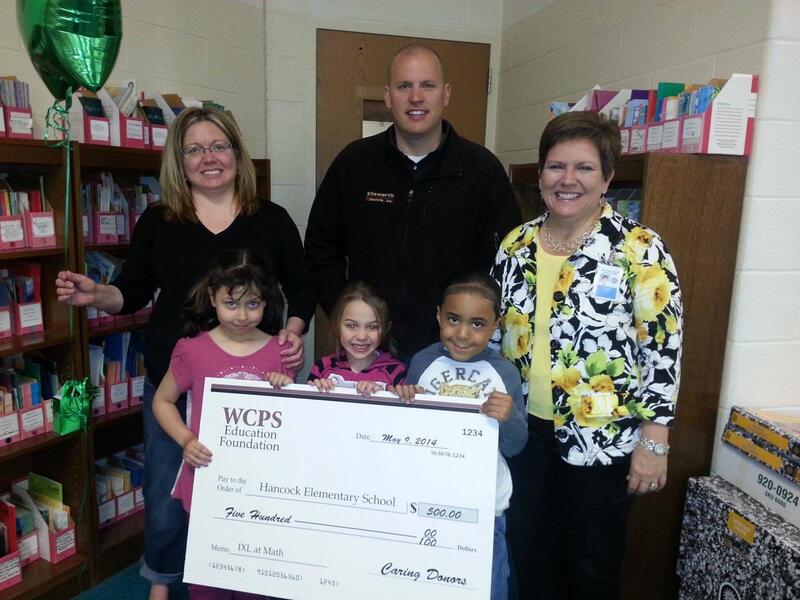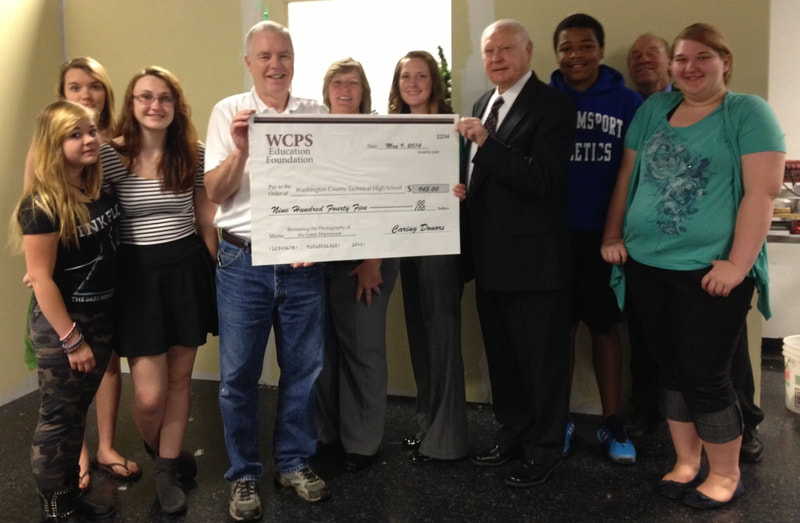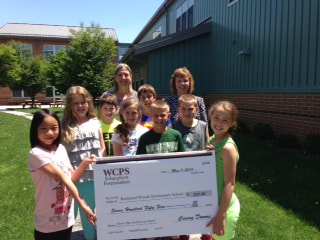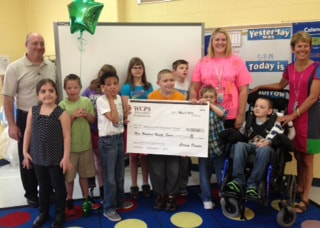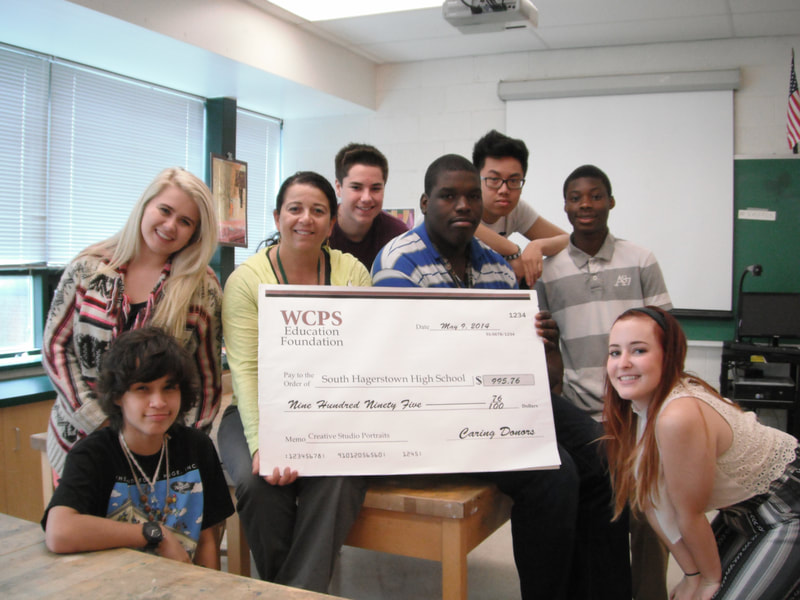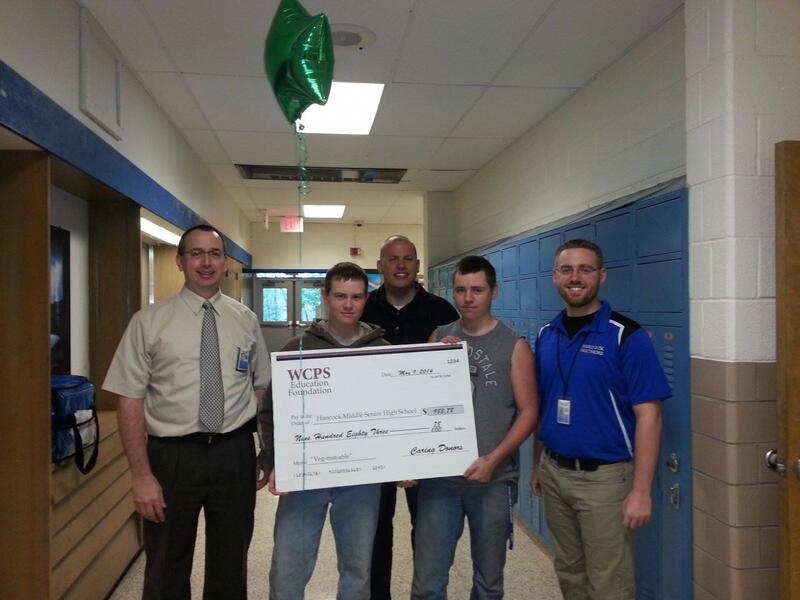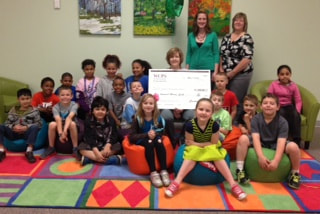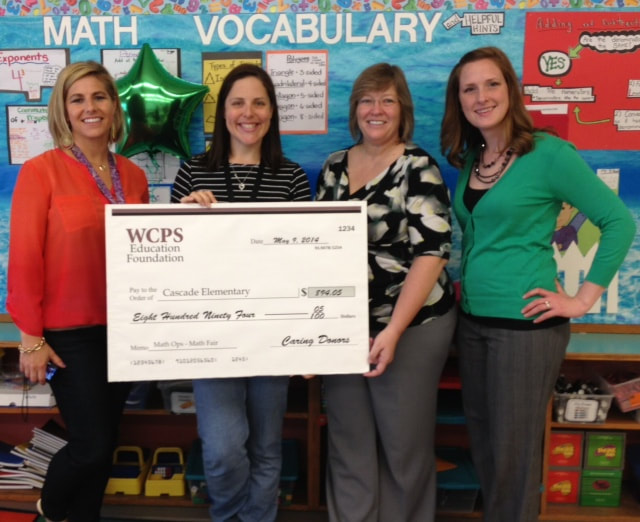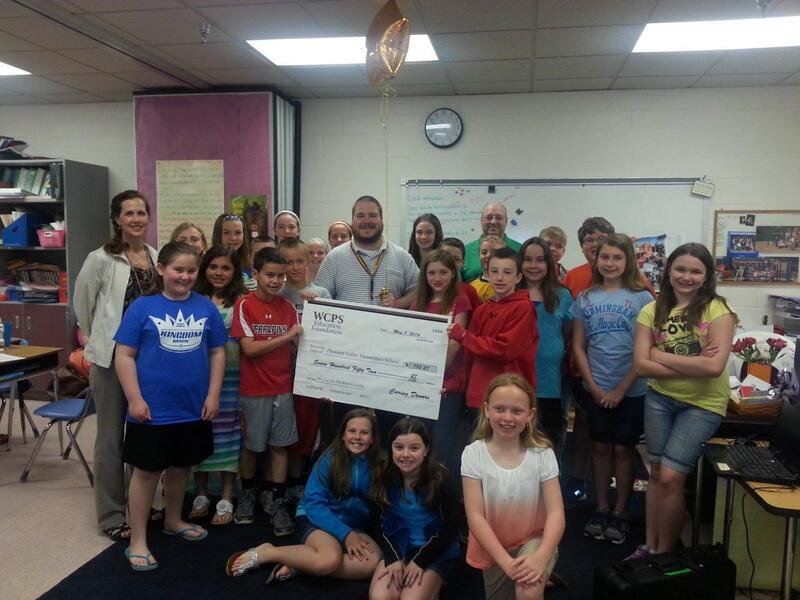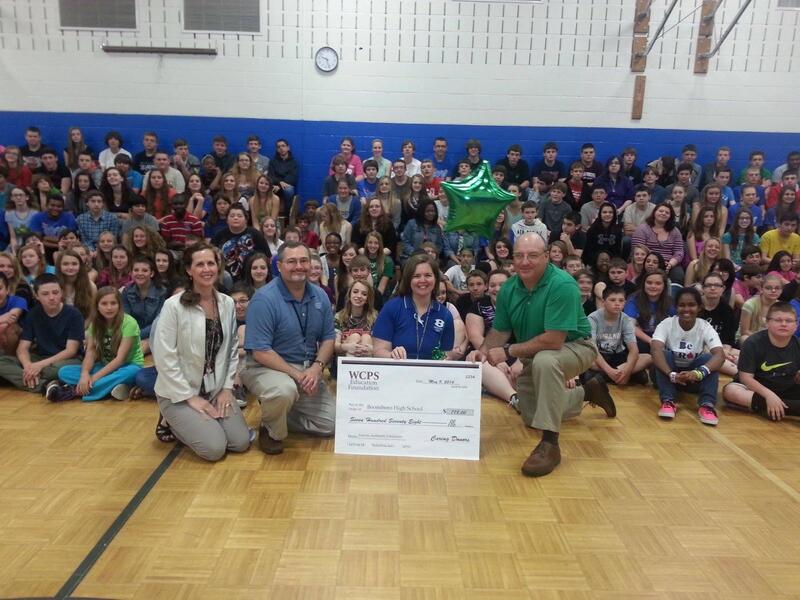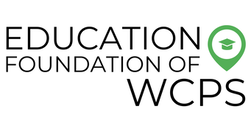2014 Innovative Grant Awards
Danette Santor – Hancock Elementary School
Award: $500
Project: IXL at Math
IXL is a web-based program aligned to Common Core and Kindergarten curriculum that enables the student to see a step-by-step example of how to correctly solve the problem if the question is answered incorrectly. The program enables the teacher to access the number and type of problems each child works on, their score and the amount of time spent using the program. The project goal is that each child will log into IXL for 1-2 hours each month. A Math Institute game and a math supply kit will be provided for each student to keep at home to play twice a week as a homework expectation. A pilot of the XL program was personally funded by the teacher for use in the 2013-14 school year. Students have enthusiastically utilized the program and have shown improved scores in math testing. The nine students who logged-in to the IXL program the most showed an average of 21 point growth in MAPS test scores from the fall.
Tom Mazzone – Hancock Middle Senior High School
Award: $983.78
Project: Veg-mat-able
The “Veg-mat-able” is a hands-on learning experience for students enrolled in the Horticulture class. Each student will create a vegetable mat which they may take home to use and keep. Students will gain an understanding of seed identification, vegetable identification, planting times, plant spacing, irrigation, and weed management. Students will plant, care for, and harvest 17 different vegetables on the mat. Flowers will also be planted on the mat to teach about pollination. This project almost entirely encompasses all major points of the Horticulture course in one assignment. While the project teaches students about growing vegetables in school, the benefits most definitely extend off the school grounds. Students using the mat at home will have access to nutritious vegetables which can be enjoyed by themselves and their families.
Colleen Ayling – Maugansville Elementary School
Award: $997.20
Project: Intermediate Life Skills Garden
Learning about the process of growing food helps children develop an understanding of the connection between healthy eating and a healthy body. A school garden provides a base of knowledge that allows children to take an active role in healthy food choices. The Intermediate Life Skills Garden project will provide the Life Skills students with multiple raised garden beds that will allow hands-on learning for all children, including those in wheelchairs. The opportunities for hands-on learning through exploration, experimentation and nurturing can be especially beneficial for children with special needs. The garden will provide “real world” examples and experiences that boost learning for students who thrive on practical instruction and will integrate math, science, and health curriculum.
Wendy Rodgers – Hickory Elementary School
Award: $998
Project: Second Grade Community Garden
One of the real-world problems regularly faced by students is that of proper nutrition and hunger. This project will, with the help of technology, provide students with an opportunity to identify this problem, research a solution, and create a plan to take back into their real-life communities to impact change. Students will be given the problems of feeding a certain number of people for a month. They will use iPads to research and design a garden that will grow with the right type of vegetables and fruits to meet the nutritional needs of the population. The students will calculate costs, write a proposal, edit and design their garden. Using the iPad applications, the students will create a demonstration/exhibit to present their design to the class. In addition to providing an opportunity to utilize technology in an effective, engaging, and meaningful way, this classroom project has the potential to develop into a collaborative community project that will improve the lives and health of students and their families.
John Jones – Washington County Technical High School
Award: $945
Project: Recreating the Photography of the Great Depression
Digital Photography students traditionally shoot beautiful fashion images in the studio. This project will take students back in time to study the work of master photographers of the 1930s and challenge them to recreate the style of photography common during the Great Depression. With the help of the Washington County Ag Museum, which has agreed to allow students to use their collections of early twentieth century household items as backdrops for this project, students will gain an appreciation for modern history while gaining an understanding of how photography was used as an effective tool for social change long before the internet. Local farms may also be used as a setting for the photography project. The project will culminate in a public presentation of student work at the Ag Museum. Transportation, printing and mounting of museum grade images, costuming, and props will be funded by this grant.
Kathryn Quigley – Marshall Street SchoolAward: $999.69
Project: Adaptive Music
The unique music program at Marshall Street School is a powerful tool connecting common core goals and life skills through musical development. Lessons are crafted to reinforce success through participation in activities not requiring advanced motor, visual, and verbal skills. Through the purchase of diverse, creative, and unique musical instruments and related items, all students will be able to have the opportunity to experience and connect with music in a way that celebrates their abilities taking into consideration their individual special needs and capabilities. Adaptive instruments such as lighted musical tambourines, ring around bells, and table mounted castanets will provide a fulfilling musical experience that creates a sense of self-worth and behavioral and emotional well-being for the students. The adaptive music project will support achievement of IEP goals, provide cognitive and academic support for the students, as well as aid in the development of motor, communication, social and life skills.
Erin Code – Cascade Elementary School
Award: $894.05
Project: Math Ops Math Fair
The Math Ops Fair project is a culminating event in the classroom. Students are challenged during the school year to complete a series of tasks that covering four of the Common Core Math Domains as well as master all 28 levels of math facts. Upon completion of these tasks, student success is celebrated and highlighted in the classroom. The final challenge within the Math Ops program is a Math Fair in which the students research and create a math project and present it at an open-house style event to parents and teachers. The Math Ops program is intended to excite and encourage students in their math education. Math Fair projects are chosen by the students, promoting self-directed learning. Students will use multiple practices such as making sense of the problem and persevering in solving it, modeling with mathematics, and attending to precision, all intended to impact students in such a way that they strive to look for math in their everyday lives. Funding for the math literature and material for the Math Fair will allow all students to participate in this culminating “Math Ops” challenge without restriction of family contribution of materials or funds.
Lorna Burdick – Rockland Woods Elementary School
Award: $775
Project: How’s the weather up there?
Installing a weather station to the roof of the school will enable all students in the building to utilize weather information, which will be accessible through the school’s computer network, for use across the science, math and use of technology (STEM) curriculum. As part of the second grade weather unit, students will be able to closely examine and even predict the local weather by utilizing the latest technology. Other grades can utilize the local weather information while studying native plants and animals to determine why our climate is right for them. Even Pre-K and Kindergarten students can use this technology to determine the correct clothes to wear and what their outdoor activities might consist of. The weather station and WeatherLink IP will also be utilized by the Science Club and Green Club throughout the year. This project will benefit the entire school in numerous ways for numerous years.
Daniel Lindner – Pleasant Valley Elementary School
Award: $752.27
Project: We Can Do the Rubik’s Cube
This project utilizes a 40 year old plastic toy to create a community of learners who will cooperatively share their experiences and encourage others to join them. Students will learn how to use/solve the cube by using the instructional pamphlets and lesson plans from the You Can Do the Rubik’s Cube! program. Students would be able to take the cubes home to practice. Creation of an after school Rubik’s Cube Club is a possibility. Students will progress to creating their own solution algorithms and collaboratively creating mosaics out of multiple cubes. The project will culminate in an annual Rubik’s Cube competition in which parents and community members would be invited to participate. Students would serve as mentors for the parents and community members as they learn how to solve the cubes. The project is aligned to Common Core math standards, Maryland STEM standards, and 21st Century learning skills. Students will learn and use important math concepts including area, perimeter, volume, angles, and algorithms. The cubes also teach life lessons and skills such as focus, following directions, memorization, sequencing, problem solving, critical thinking and perseverance.
Jacqueline Rebok – Boonsboro High School
Award: $778
Project: French Authentic Literacy
The goal of the French Authentic Literacy project is to regularly expose students in French classes to current publications marketed to their peers in French-speaking countries. Students in these classes will work to create a French reading/periodicals/research section in the Boonsboro High School Media Center, providing student exposure to other cultures and languages. The project will support the district-wide Student Learning Objective related to literacy, allowing BHS students to subscribe to three French daily magazines, delivered in multiple formats (mobile app, PDF version, and hard copy) will allow students to analyze and synthesize texts, apply critical thinking and comprehension skills, and differentiate between literary and nonfiction texts. The project will link current events to students’ lives and interests and expand their world view beyond BHS, Washington County, Maryland, and the United States.
Aubrey Hammond – South Hagerstown High School
Award: $995.76
Project: Creative Studio Portraits
Enhancing the existing photo studio environment and related equipment will provide Photography I students the opportunity to experiment and experience all aspects of taking portraits in a modern studio setting. The addition of up-to-date photographic equipment will allow for expansion of the Portrait Photography Unit and enhance the program of study. Students will participate in a variety of studio projects including Studio Portraits, Still Life, Photojournalism, Landscapes, and Action Photography, geared around taking portraits using 35mm camera and digital photography. They will also have the experience of using editing software to experiment with enhancements, collage, and touchup. Students will have more time and tools to experiment, create, and edit their photos. The project will offer, encourage, and inspire each student to expand their knowledge of the processes of studio portrait photography, new technology, and editing software in relation to the standard 25mm process that is developed in black and white film format. Artwork created during the projects will be reviewed and submitted to various art shows and reviews.
FASFA Frenzy Laptop Winner
Hart Weaver, Williamsport High School
Award: $500
Project: IXL at Math
IXL is a web-based program aligned to Common Core and Kindergarten curriculum that enables the student to see a step-by-step example of how to correctly solve the problem if the question is answered incorrectly. The program enables the teacher to access the number and type of problems each child works on, their score and the amount of time spent using the program. The project goal is that each child will log into IXL for 1-2 hours each month. A Math Institute game and a math supply kit will be provided for each student to keep at home to play twice a week as a homework expectation. A pilot of the XL program was personally funded by the teacher for use in the 2013-14 school year. Students have enthusiastically utilized the program and have shown improved scores in math testing. The nine students who logged-in to the IXL program the most showed an average of 21 point growth in MAPS test scores from the fall.
Tom Mazzone – Hancock Middle Senior High School
Award: $983.78
Project: Veg-mat-able
The “Veg-mat-able” is a hands-on learning experience for students enrolled in the Horticulture class. Each student will create a vegetable mat which they may take home to use and keep. Students will gain an understanding of seed identification, vegetable identification, planting times, plant spacing, irrigation, and weed management. Students will plant, care for, and harvest 17 different vegetables on the mat. Flowers will also be planted on the mat to teach about pollination. This project almost entirely encompasses all major points of the Horticulture course in one assignment. While the project teaches students about growing vegetables in school, the benefits most definitely extend off the school grounds. Students using the mat at home will have access to nutritious vegetables which can be enjoyed by themselves and their families.
Colleen Ayling – Maugansville Elementary School
Award: $997.20
Project: Intermediate Life Skills Garden
Learning about the process of growing food helps children develop an understanding of the connection between healthy eating and a healthy body. A school garden provides a base of knowledge that allows children to take an active role in healthy food choices. The Intermediate Life Skills Garden project will provide the Life Skills students with multiple raised garden beds that will allow hands-on learning for all children, including those in wheelchairs. The opportunities for hands-on learning through exploration, experimentation and nurturing can be especially beneficial for children with special needs. The garden will provide “real world” examples and experiences that boost learning for students who thrive on practical instruction and will integrate math, science, and health curriculum.
Wendy Rodgers – Hickory Elementary School
Award: $998
Project: Second Grade Community Garden
One of the real-world problems regularly faced by students is that of proper nutrition and hunger. This project will, with the help of technology, provide students with an opportunity to identify this problem, research a solution, and create a plan to take back into their real-life communities to impact change. Students will be given the problems of feeding a certain number of people for a month. They will use iPads to research and design a garden that will grow with the right type of vegetables and fruits to meet the nutritional needs of the population. The students will calculate costs, write a proposal, edit and design their garden. Using the iPad applications, the students will create a demonstration/exhibit to present their design to the class. In addition to providing an opportunity to utilize technology in an effective, engaging, and meaningful way, this classroom project has the potential to develop into a collaborative community project that will improve the lives and health of students and their families.
John Jones – Washington County Technical High School
Award: $945
Project: Recreating the Photography of the Great Depression
Digital Photography students traditionally shoot beautiful fashion images in the studio. This project will take students back in time to study the work of master photographers of the 1930s and challenge them to recreate the style of photography common during the Great Depression. With the help of the Washington County Ag Museum, which has agreed to allow students to use their collections of early twentieth century household items as backdrops for this project, students will gain an appreciation for modern history while gaining an understanding of how photography was used as an effective tool for social change long before the internet. Local farms may also be used as a setting for the photography project. The project will culminate in a public presentation of student work at the Ag Museum. Transportation, printing and mounting of museum grade images, costuming, and props will be funded by this grant.
Kathryn Quigley – Marshall Street SchoolAward: $999.69
Project: Adaptive Music
The unique music program at Marshall Street School is a powerful tool connecting common core goals and life skills through musical development. Lessons are crafted to reinforce success through participation in activities not requiring advanced motor, visual, and verbal skills. Through the purchase of diverse, creative, and unique musical instruments and related items, all students will be able to have the opportunity to experience and connect with music in a way that celebrates their abilities taking into consideration their individual special needs and capabilities. Adaptive instruments such as lighted musical tambourines, ring around bells, and table mounted castanets will provide a fulfilling musical experience that creates a sense of self-worth and behavioral and emotional well-being for the students. The adaptive music project will support achievement of IEP goals, provide cognitive and academic support for the students, as well as aid in the development of motor, communication, social and life skills.
Erin Code – Cascade Elementary School
Award: $894.05
Project: Math Ops Math Fair
The Math Ops Fair project is a culminating event in the classroom. Students are challenged during the school year to complete a series of tasks that covering four of the Common Core Math Domains as well as master all 28 levels of math facts. Upon completion of these tasks, student success is celebrated and highlighted in the classroom. The final challenge within the Math Ops program is a Math Fair in which the students research and create a math project and present it at an open-house style event to parents and teachers. The Math Ops program is intended to excite and encourage students in their math education. Math Fair projects are chosen by the students, promoting self-directed learning. Students will use multiple practices such as making sense of the problem and persevering in solving it, modeling with mathematics, and attending to precision, all intended to impact students in such a way that they strive to look for math in their everyday lives. Funding for the math literature and material for the Math Fair will allow all students to participate in this culminating “Math Ops” challenge without restriction of family contribution of materials or funds.
Lorna Burdick – Rockland Woods Elementary School
Award: $775
Project: How’s the weather up there?
Installing a weather station to the roof of the school will enable all students in the building to utilize weather information, which will be accessible through the school’s computer network, for use across the science, math and use of technology (STEM) curriculum. As part of the second grade weather unit, students will be able to closely examine and even predict the local weather by utilizing the latest technology. Other grades can utilize the local weather information while studying native plants and animals to determine why our climate is right for them. Even Pre-K and Kindergarten students can use this technology to determine the correct clothes to wear and what their outdoor activities might consist of. The weather station and WeatherLink IP will also be utilized by the Science Club and Green Club throughout the year. This project will benefit the entire school in numerous ways for numerous years.
Daniel Lindner – Pleasant Valley Elementary School
Award: $752.27
Project: We Can Do the Rubik’s Cube
This project utilizes a 40 year old plastic toy to create a community of learners who will cooperatively share their experiences and encourage others to join them. Students will learn how to use/solve the cube by using the instructional pamphlets and lesson plans from the You Can Do the Rubik’s Cube! program. Students would be able to take the cubes home to practice. Creation of an after school Rubik’s Cube Club is a possibility. Students will progress to creating their own solution algorithms and collaboratively creating mosaics out of multiple cubes. The project will culminate in an annual Rubik’s Cube competition in which parents and community members would be invited to participate. Students would serve as mentors for the parents and community members as they learn how to solve the cubes. The project is aligned to Common Core math standards, Maryland STEM standards, and 21st Century learning skills. Students will learn and use important math concepts including area, perimeter, volume, angles, and algorithms. The cubes also teach life lessons and skills such as focus, following directions, memorization, sequencing, problem solving, critical thinking and perseverance.
Jacqueline Rebok – Boonsboro High School
Award: $778
Project: French Authentic Literacy
The goal of the French Authentic Literacy project is to regularly expose students in French classes to current publications marketed to their peers in French-speaking countries. Students in these classes will work to create a French reading/periodicals/research section in the Boonsboro High School Media Center, providing student exposure to other cultures and languages. The project will support the district-wide Student Learning Objective related to literacy, allowing BHS students to subscribe to three French daily magazines, delivered in multiple formats (mobile app, PDF version, and hard copy) will allow students to analyze and synthesize texts, apply critical thinking and comprehension skills, and differentiate between literary and nonfiction texts. The project will link current events to students’ lives and interests and expand their world view beyond BHS, Washington County, Maryland, and the United States.
Aubrey Hammond – South Hagerstown High School
Award: $995.76
Project: Creative Studio Portraits
Enhancing the existing photo studio environment and related equipment will provide Photography I students the opportunity to experiment and experience all aspects of taking portraits in a modern studio setting. The addition of up-to-date photographic equipment will allow for expansion of the Portrait Photography Unit and enhance the program of study. Students will participate in a variety of studio projects including Studio Portraits, Still Life, Photojournalism, Landscapes, and Action Photography, geared around taking portraits using 35mm camera and digital photography. They will also have the experience of using editing software to experiment with enhancements, collage, and touchup. Students will have more time and tools to experiment, create, and edit their photos. The project will offer, encourage, and inspire each student to expand their knowledge of the processes of studio portrait photography, new technology, and editing software in relation to the standard 25mm process that is developed in black and white film format. Artwork created during the projects will be reviewed and submitted to various art shows and reviews.
FASFA Frenzy Laptop Winner
Hart Weaver, Williamsport High School
